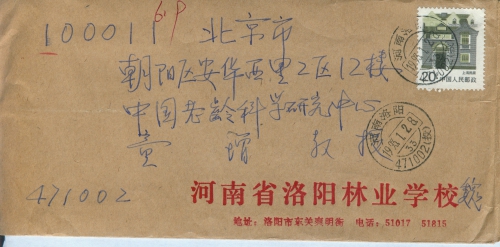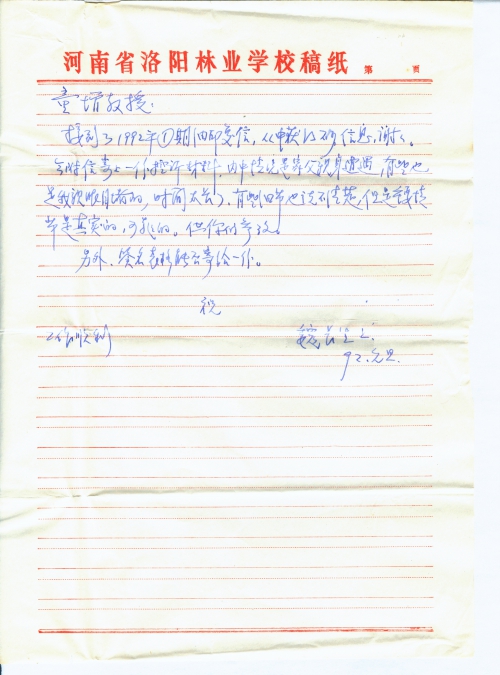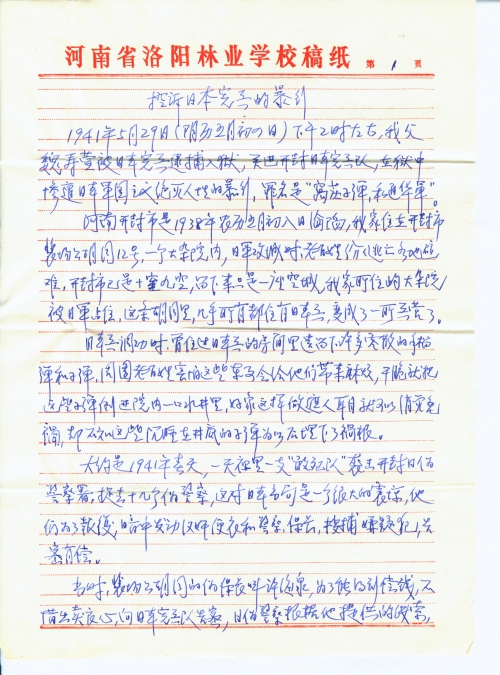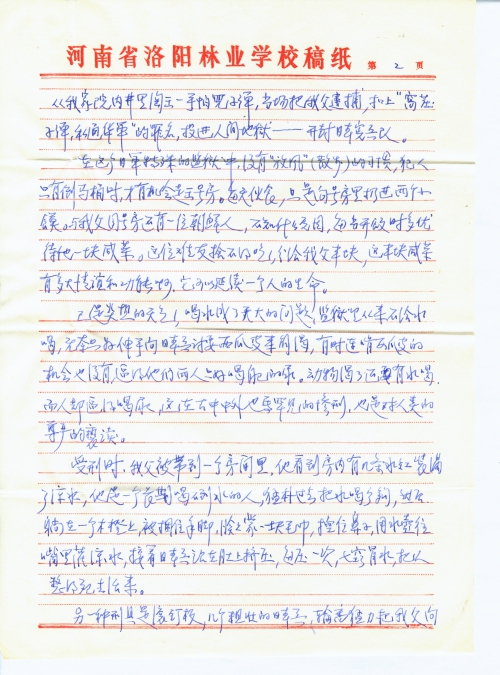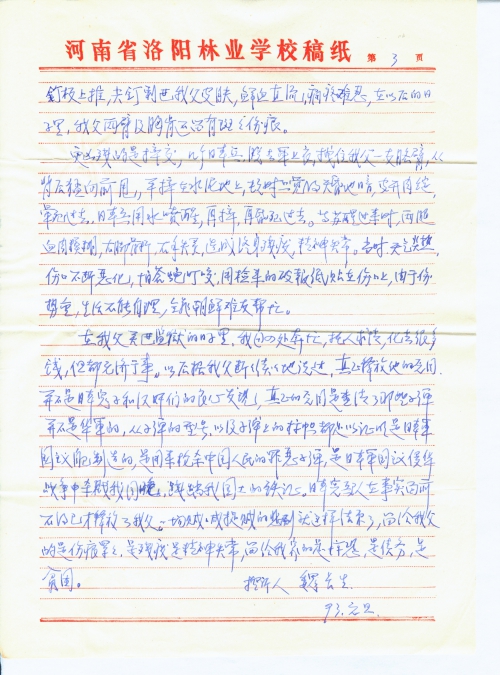Date of letter:1993-01
Address of author:Luoyang City, Henan Province
Date of event:1938, 1941
Location of event:Kaifeng City, Henan Province
Name of author:Wei Changsheng
Name(s) of victim(s):Wei Shouxuan
Type of atrocity:Others (OT)
Other details:In the fifth lunar month of 1938, the Kaifeng City fell into the hands of Japanese. Its people fled, leaving it a ghost town. On May 29, 1941, my father Wei Shouxuan was arrested by the Japanese, who was given no water and forced to drink his own urine in hot days. He was heavily tortured: the Japanese took him to a room, made him drink a lot of water and then stood on his stomach. Water came out from virtually all holes of his head. He was even pushed onto pinboard, with the spikes piercing into his skin and making him bleed like hell.
Professor Tong Zeng:
I’ve received a copy of your letter of Issue ①, 1992, and gained a lot of information from it. Thank you.
Attached to my letter herewith are statements of accusation which describe my father’s personal experience, some of which I had witnessed. Some details cannot be described clearly because it’s been so long, but the main content is genuine and reliable for your reference.
By the way, could you send me a copy of the application form?
Best wishes.
Wei Changsheng
Lunar January 1, 1992
Accusations Against the Japanese Gendarmerie of Atrocious Crimes
At about 2 p.m. on May 29, 1941, my father Wei Shouxuan was arrested on a charge of “harboring bullets and having secret communication with the Chinese army” and put to jail by the Japanese gendarmerie of Kaifeng, where he suffered inhuman atrocities from the Japanese militarist army.
Kaifeng, He’nan fell into the hands of the Japanese Imperialism on lunar May 8, 1938. My family then lived in a traditional Chinese courtyard at No. 12, Peichanggong Avenue, Kaifeng. As the Japanese army attacked the city, people of Kaifeng randomly fled to other places, leaving the city empty. The courtyard where we lived was occupied by the Japanese army, and there were Japanese soldiers living in almost all courtyards along the avenue, turning the avenue into a military camp.
When the Japanese soldiers were on maneuvers, they left behind some grenades and bullets in the houses where they had stayed. Fearing that the weapons may cause trouble, the local people dumped them into a well in the courtyard. It seemed that disasters could be avoided in this way, but they didn’t know that these bullets at the bottom of the well planted seeds of future disaster.
One night perhaps in the spring of 1941, a death squad attacked the Japanese Puppet Police Department of Kaifeng and captured over 10 puppet policemen. This was a great shock to the Japanese authority. To avenge this, they secretly mobilized traitors, policemen and puppet officers to search and arrest suspects and reward informants.
At that time, the puppet officer of Peichanggong Avenue was Xu Haiquan. In order to gain monetary reward, he betrayed his conscience and informed the Japanese gendarmerie. Based on the clues provided by him, the Japanese puppet police found some bullets, wrapped in a handkerchief, from the well of my house and arrested my father onsite on a charge of “harboring bullets and having secret communication with the Chinese army” and sent him to the living hell, i.e., the Japanese gendarmerie of Kaifeng.
In this special Japanese prison, there was no allowance for prisoners to get out the cells for exercise (“releasing”), so the prisoners only had a chance of leaving the cell when emptying the toilet. Every day, two small buns would be thrown into the cell as food. There was a Korean in the same cell as my father. For unknown reasons, he would be preferentially treated by getting a lump of pickle for each meal. He would share it with my father. What an enormous friendship and good function the pickle provided! It could prolong a person’s life.
In hot summer, drinking water became a big issue. They were never given water to drink in the prison, so they had to beg the Japanese soldiers for watermelon peel to quench their thirst. Sometimes, they even had no watermelon peel to eat, so they were forced to drink their own urine. Even animals had water to drink, while humans were forced to drink their urine. This was a rare brutal punishment, even in the history of the world, as well as blasphemy to human dignity.
My father would be taken to a room to be tortured. When he saw several tanks filled with cold water in the room, he suddenly ran over to drink enough due to long-term thirst. Then, he was tied to a wood stool with a towel placed on his face. The soldiers then pinched his nose, forced cold water into his mouth using a pot and then stood on his belly to press. Each pressing would cause water flowing from all of his body orifices. What a torture.
Another instrument of torture was a nail plate. Several strong Japanese soldiers would push my father hard on the nail plate. As the spikes pierced my father’s skin, he bled and hurt badly. After that, and to this day, my father still bore scars on his arms, chest and back.
A more brutal punishment is wrestling. Several Japanese soldiers would take off their military coat and grab my father by his arm to throw him from behind. My father would be thrown on the cement ground, ended with broken skin and open flesh and blacked out. The Japanese soldiers would wake him up with water and throw him again. And my father would black out again. When it’s over, his legs were covered with blood, right foot was broken and right hand ineffective, resulting in permanent disability and mental disorders. At that time, as the wound continued to deteriorate in hot weather, my father wrapped it with worn newspaper to avoid flies. My seriously injured father couldn’t take care of himself; luckily, his Korean inmate helped him get by.
During the days when my father was imprisoned, my mother spent much money seeking help but all were in vain. My father said later that the true reason for his being released was not that the Japanese soldiers and traitors suddenly had a conscience, but they identified from the pattern and logo of the bullets that they were made by themselves instead of by the Chinese army. These evil bullets were firm evidence that the Japanese militarism massively killed our Chinese people and trampled our land during its war of aggression against China. The Japanese gendarmerie had no choice but to release my father in front of truth. A tragedy of “thieves catch thieves” ended like that, leaving my father scarred, crippled and mentally insane, and bringing horror, debt and poverty to my family.
Complaint: Wei Changsheng
Lunar January 1, 1993














